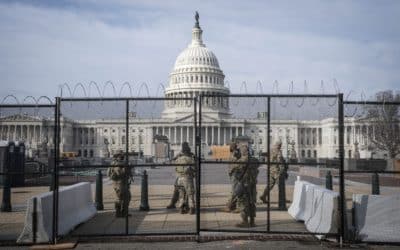Having unilaterally stepped out of the Iran nuclear deal in May, the Trump administration reimposed sanctions on the Islamic Republic earlier this week, part of another so-called “maximum pressure” campaign.
The new sanctions will target Iran’s purchases of U.S. dollars, precious metals trading, industrial software, Iran’s coal industry and its automotive sector. Sanctions on Iran’s oil industry are also set to begin in November.
All of the above is sure to inflict pain on Iran’s civilian population.
Indeed, that is a common intended effect of sanctions: to impose suffering on civilians in hopes they will pressure their own government to comply with American demands.
Not only does such an economic offensive amount to an act of war, the idea that sanctions will spur citizens to action is not borne out in practice, especially in Iran. The more likely result is to inspire a siege mentality in the populace—who instead view their leaders as their protectors—while also reinforcing hatred for the West.
Iraqi Prime Minister Haider al-Abadi put it well in a recent press conference: “[S]anctions destroy societies and do not weaken regimes.”
Speaking of Iraq, consider the sanctions imposed on that country under the Clinton administration. Though they were “worth it” in the well-known words of an American diplomat, they also killed hundreds of thousands of people. Those sanctions didn’t just fail to provoke Iraqis to overthrow Saddam Hussein, they inspired hatred for the United States the world over (including in the mind of Osama bin Laden, who used this stain on America’s record as a propaganda device).
Using sanctions to bully Iran’s citizenry, then, is not a viable strategy.
The new round of sanctions is also unlikely to accomplish the administration’s more immediate goal: bringing Iran back to the negotiation table.
Trump’s unilateral withdrawal from the JCPOA can only be taken by Iranian leadership as the deepest insult, the greatest sign of bad faith. Iranian President Hassan Rouhani, long a major backer of the deal, has drawn a hard line in the sand, stating that Iran will not negotiate as long as the US continues to violate the terms of the deal reached in 2015.
Resistance from Abroad
A handful of world powers, among them US allies, are chafing against the renewed sanctions. With the obvious exception of the US, the P5+1 states (France, UK, China, Russia, plus Germany) insist they’re sticking to the nuclear deal. Compliance with American sanctions in this case would amount to a violation of the deal on the behalf of the other signatories, as the normalization of trade relations is one of the JCPOA’s terms.
China, Iran’s biggest oil customer, recently reaffirmed its position that it would not go along with the sanctions, a major damper on Washington’s aims. Because there’s not a huge amount of US-Iranian business to cut off in the first place, to achieve the intended effect the US must pressure other countries into halting trade.
The EU is pushing back, too. In May, soon after Trump pulled out of the JCPOA, the foreign ministers of France, Germany, Britain and Iran were already working on what they called a “nine-point plan” to keep Iran in from the cold.
EU officials are also working to update a statute known as the “Blocking Regulation,” which was initially drawn up in 1996 to prohibit institutions under EU jurisdiction from complying with American secondary sanctions related to Cuba.
Primary sanctions include the freezing of assets, restrictions on US citizens from doing business with the sanctioned entity, or outright trade embargoes. Secondary sanctions, on the other hand, involve pressuring allies to stop doing business with the country in question. Companies that fail to go along are cut off from the American financial system.
For European businesses, that threat could prove more compelling than the Blocking Regulation itself. Companies may simply avoid the regulation and comply with the sanctions for the sake of staying in the good graces of US finance.
Earlier this week President Trump promised worldwide secondary sanctions for anybody who continued dealings with Iran, which puts European companies between a rock and a hard place.
Several large European firms have already announced they’d be getting out of Iran due to the sanctions:
A French shipping company (CMA CGM), two French car manufacturers (PSA and Renault), and a French oil company (Total) have ceased operations and investments in Iran. The same goes for a large Danish shipping firm (Maersk) and a German auto company (Daimler).
SWIFT
Of particular importance for Iranian trade relations is the Society for Worldwide Interbank Financial Telecommunication, or SWIFT, an institution that facilitates financial transactions across borders between several different countries.
SWIFT is based in Belgium and resides under the jurisdiction of the EU. Going forward, it’s crucial that the EU keeps that organization from complying with American demands, which would cripple Iran’s ability to do business internationally.
There is a possibility that the Trump administration could impose sanctions on SWIFT itself, but the costs of interfering with such a significant institution may be prohibitively high.
Given the staunch resistance offered by the P5+1 nations, as well as a few unlikely dissidents, it remains to be seen what kind of teeth the new round of sanctions will have. Beyond dispute, however, are very real tensions growing between the US and its imperial satellites in Europe, a welcomed silver lining in an otherwise dismal situation.
TGIF: Warm Individualism or Cold Collectivism?
Newly inaugurated New York City Mayor Zohran Mamdani promises to "replace the frigidity of rugged individualism with the warmth of collectivism." Funny that he chose those words. In Europe, where collectivist anti-fossil-fuels "green" policies have been enacted in the...































